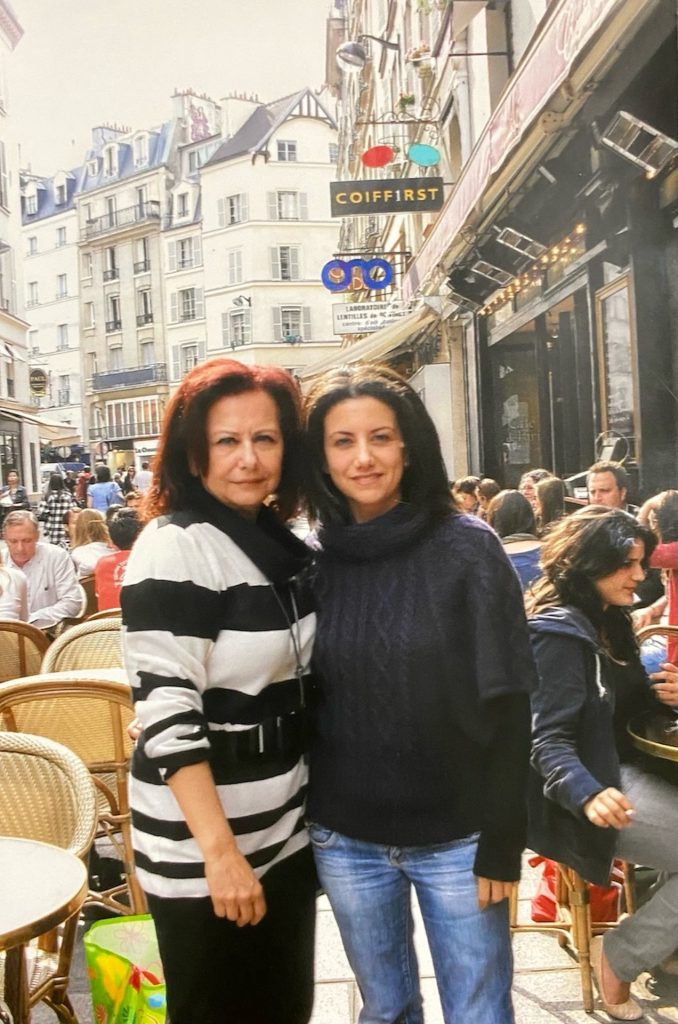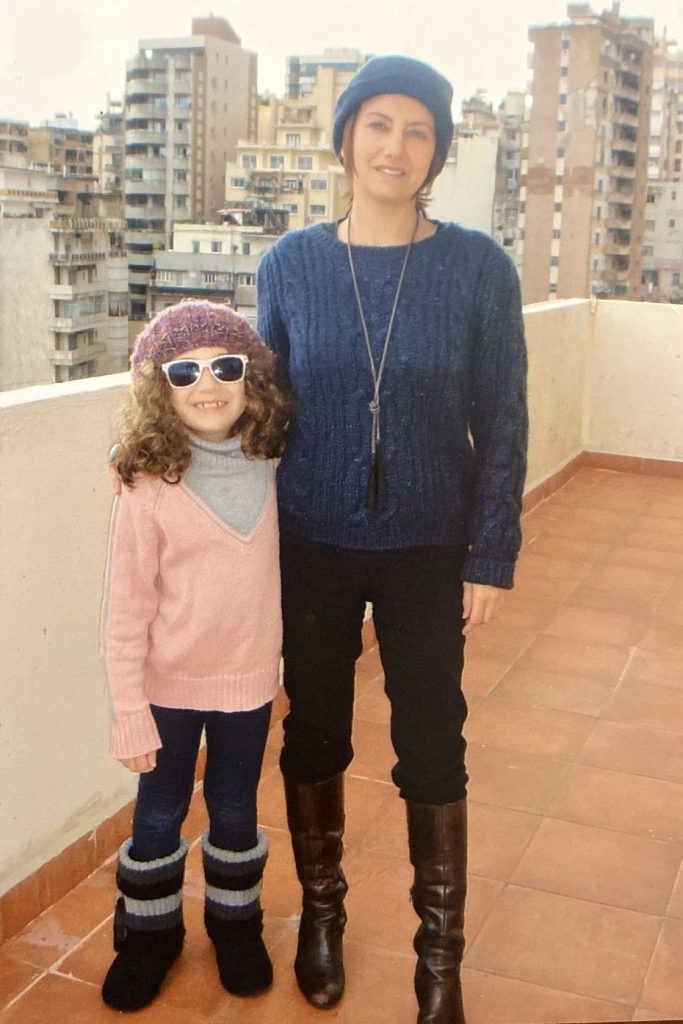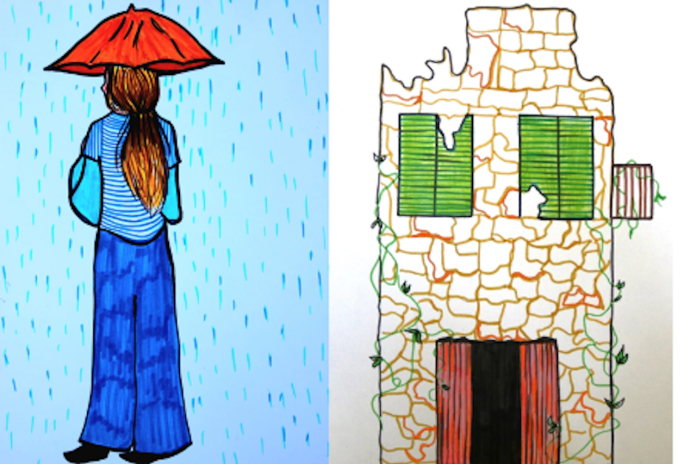Beirut 1992
Light drizzle taps the blue-eyed girl on the shoulder. With a gleam in her eye and nervous flutter in her chest, she clutches onto the pamphlets like her lifeline. George and Abdo, freshly 19, race toward her, breathless, “how many houses Carla?”
“Just start with the apartments up ahead,” Carla calls back.
The streets of Achrafieh are lined with surviving apartment blocks, their facades suffocated by tangled wires, while unloved ginger cats tiptoe through the streets with the same stealth as the teenagers.
They reach the entrance of a dingy, concrete five-storey complex, the main door ageing as each speck of blue paint disintegrates into dust.
Carla takes a deep breath and slides a pamphlet under the door. It gets jammed for a second, staring back at the group and reminding them of its message: ‘Deny the Syrian Militia, Save Lebanon.’
Breathe out.
Abdo and George smile, “Let’s keep going!”
The group picks up the pace, trekking down the street. They place the pamphlets under luxurious doors, broken mesh doors, in mailboxes and folded in the hoods of Toyota Corollas and BMWs.
The drizzle, now rain, hits Carla’s denim-cladded shoulders like a warning. Suddenly, their ears are assaulted by a menacing engine roaring behind them.
Stop. The engine’s noise intensifies. Hearts revving, they turn their heads slightly.
Green. Camo uniforms. Syrian flag.
They drop the pamphlets. Run.
They were almost at the end of the street before they heard the militia’s deafening footsteps. They stop, knowing their fate. Carla, looking away, feels rough hands grab her arm to turn her towards them. She keeps her eyes to the gravel, and like a limp doll, allows the metal cuffs to clasp around her wrists.
Her hands tremble as they guide her toward the truck awaiting them – but she can’t see the boys. “Where are my friends?” she asks, her voice breaking with panic. The soldier, his gaze fixed ahead, replies stoically, “They’re in the other truck.” Tears stream uncontrollably down her face, pleading, “But I’m alone. Why can’t I be with them?”
“They are boys.”
In the truck, she keeps her head down and steadies her breathing, silently praying to the Virgin Mary for protection.
Her empty cell beckons her in, hungry for the guilty, hungry for the innocent. Still in her bruised jeans and denim jacket she climbs into her slab, stares at the water-stained ceiling, and digs her nails into her skin. Two nights and three days drag by, each moment stretching painfully like an echo of the lifetime of suffering war has inflicted upon her distilled into this singular, excruciating experience.
They allowed her to call her favourite aunty, Amal, to save them. The aunt who loves to socialise, the one with a friend in every place.
That’s how it works. Your rights are fickle, your life is fickle. Sobbing from relief and exhaustion, she runs into Amal’s arms sobbing, “I’m tired, I’m tired. I can’t live like this.”
Sydney 2024
That blue-eyed girl who braved the depths of Lebanese jail at the ripe age of 19, simply because she dared retaliate against a poisonous government, is my mother. I’m 19 now, a slightly paler, more Australian version of her, and I hope to possess even an ounce of her strength one day. But tip-toeing around an illegitimate government was the reality of Lebanese life.
Lebanon was the jewel of the Middle East, historically rich and culturally vibrant; life was modern, sexy and free. By 1975, war had arrived with tensions internally and externally at a breaking point. The country, home to Maronite Catholics, Sunni and Shia Muslims, Druze, Alawites and many more sects, was fraught with sectarian and political divisions. External influences, including but not limited to Syria and Israel, exacerbated these divisions, and by 1976 Syria intervened under the guise of peacekeeping. The militia conducted daily street battles, terrorist attacks, sieges and bombardment. Lebanon, once a beacon of artistic freedom and prosperity, descended into chaos and bloodshed.

Beirut 1993
The club lights are pulsing with energy as the Lebanese girls, classy as ever, flaunt their straightened hair, shiny makeup and new noses gifted by Dr Jamal. The blue-eyed girl is soaking in what’s left of Beirut, surrounded by five cousins and her best friends, Nadine and Katya. Carla rocks a mini leather skirt, chunky bracelet and freshly de-frizzed hair. “Yallah, let’s dance,” Nadine urges.
As Rabih El Khawli’s ‘Nwina Al Jazi Nwina’ fills the air and Carla spins her friends around, she spots a man with dark hair, hazel eyes and a long Lebanese nose, laughing on the balcony with a Heineken in hand. Their eyes meet, and he smiles, standing up straighter as they approach each other.
“How are ya?” His piercing Australian accent splits her ears, but the novelty excites her. Gazing into his eyes, she can see the future: maybe love, maybe marriage, finally an escape from Hell.
The plane
Definitely love. Clutching Jacob’s hand, tears swell as she recalls the heart-wrenching farewell hours earlier. In the bittersweet chaos of the airport, Carla stood at the centre of the turmoil, hugging her family one last time. Her mother leaned in, kissing her gently on the forehead and leaving a trace of her signature red lipstick. “Habibte,” she murmured, pinching her cheek as both of them wept and hugged so tightly as though trying to leave their unforgettable imprint on the other.
Saying goodbye to her childhood, her home and her entire life was the biggest risk she’d ever taken. But when you take the risk for stability, sometimes there’s no reward or regret; there’s just survival.
Australia 1994
With an engagement ring sparkling on her finger, Carla, having found a job after only two days of searching, waits tables at the chic North Sydney restaurant, LeSaffre. Dressed in a sleek black top and a slightly short skirt, she entices the room with her exotic French-Arabic accent.
Men from around the harbour sport Rolexes and green-and-gold kangaroo footy jerseys, and women wear elegant Chanel dresses with simple flats. She likes the subtlety of these people; it’s new. They nod to her in appreciation and engage her in conversation.
“Where are you from? I love your eyes. Isn’t it wonderful here?” With a playful smile, she replies, “Beirut, thank you! Yes, everyone here is so welcoming.”
As she serves their blue-rare steaks (unheard of in Lebanon, it’s well done or a trip to the hospital), they thank her and embrace her as one of their own in their ‘lucky country.’

Australia 2000
She cradles her eldest daughter, three-year-old Claudia, in her arms, her forehead burning with fever and her nose red and runny from wailing all day. Jacob hasn’t answered his phone since morning, tied up at a construction site in Melbourne. “Mama, mama,” Claudia calls out repeatedly, her tiny voice a constant plea for comfort.
“Maman,” Carla thought, her heart aching.
How Carla yearned for her mother’s gentle hugs, the tender kisses that left red lipstick stains on her forehead every night when she went to sleep. The way they’d laugh about boys over her cigarette tray while they ate labneh and zaatar in the mornings. The way she’d tie French multi-coloured scarves around Carla’s neck and say “kteer helween” (very beautiful). The endless flow of tears the entire day her Carloushka was preparing to move to the other side of the world.
Carla gently places Claudia on the couch and grabs her phone. It’s 4am in Lebanon, she realises, everyone is asleep.
Feeling tears welling up, she pulls Claudia close again, whispering, “It’s okay, it’s okay.” Focus, she tells herself. Claudia needs her. She pushes aside the deep ache in her chest, the longing for her mother. As she holds Claudia’s hand, she wishes she could hold her mother’s hand too, at least through the phone. But she can’t.
Present day
The other day, I sat on my mum’s bed, and we FaceTimed my Tati and Dodou, who are currently living it up with my aunty and uncle in Marseilles. When the call ended, she held me close in a tight embrace.
Looking into her saddened eyes I couldn’t help but ask, “Mum, do you feel fulfilled in Australia?”
“I love working here and I love my children.”
“But do you feel fulfilled?”
She sat up. “Charlotte, the people who made your childhood, you need them, and when I moved here, I was all alone and I had to be strong. Being alone makes me cold and empty, I feel unfulfilled. If I were with my family, I’d be more emotional.”
“Do you regret moving to Australia?”
“No, because I listened to my gut feeling. I had to leave Lebanon. Your gut, it’s always right. Don’t listen to all these voices, opinions. Listen to what’s in here because that’s probably a guardian angel telling you to do it.”
Two days ago I realised my mum traded emotional fulfilment for stability. She sacrificed the closeness she once shared with her family in favour of securing a future for her children. Risk reaps reward and regret, but ultimately it’s about sacrifice — and with sacrifice comes the constant balancing of both. But at least she can balance it in Australia, what she calls her lucky country.
This story was first published on Honi Soit


